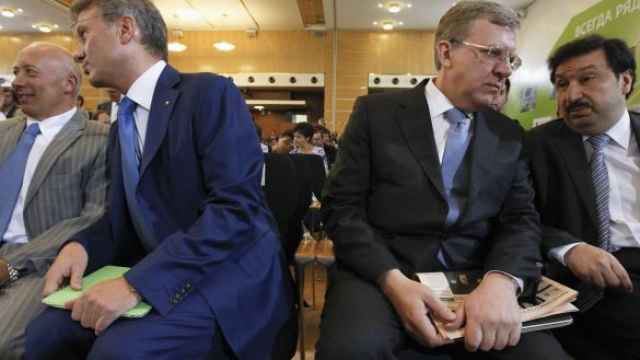Reports that prominent, liberal economist Sergei Guriyev has fled to France under pressure from investigators appeared to send shockwaves through Russia's Western-leaning elite this week, renewing fears of a brain drain amid an "invisible" wave of emigration.
The departure of Guriyev, a prominent economist who has advised Prime Minister Dmitry Medvedev and represented Russia on the international stage, seemed to be the latest sign of discontent of the Western-friendly elite, which is said to have been increasingly sidelined by President Vladimir Putin's hardline clan, rooted in the security services, since Putin's return to the presidency last May.
For well-educated Russians, it's also fueled talk of emigration, a word that has been on many peoples' lips as tough government restrictions and frustration have replaced hopes of political reform once buoyed by the now-puttering street protest movement.
"It's an increasingly popular topic of conversation among the relatively well-off, whether to emigrate or simply make sure the children get an education abroad," said Tanya Lokshina, deputy director of Human Rights Watch in Moscow. "We're talking about a major brain drain."
Every week seems to bring rumors of another high-profile opposition figure, activist, journalist or independent-minded intellectual moving abroad. In April, it was anti-Kremlin leader and former Chess champion Garry Kasparov and Pavel Durov, the brash founder of Vkontakte, Russia's largest online social network. They both denied the rumors.
Last month brought news of journalist Masha Gessen's plans to move away from "hopeless" Russia, and rumors that former-Kommersant correspondent Oleg Kashin had relocated to Switzerland. And then, this week came the bombshell about Guriyev, who investigators said had been questioned in connection to an investigation into Yukos, the defunct oil giant.
"Everyone's running away," said Mitya Aleshkovsky, 28, a photographer and prominent civil activist. Aleshkovsky said he wouldn't consider emigrating as long as Yukos' former boss, Mikhail Khodorkovsky, is in prison. Khodorkovsky, once Russia's richest man, has been in jail since 2003 on white-collar charges that are widely seen as politically motivated.
"As pompous as it sounds, Khodorkovsky sits in prison for all of us," Aleshkovsky said by telephone on Thursday. "I don't blame those who've left. Everybody has one life to live."
But many of Aleshkovsky's friends have chosen to leave. About five years ago, he had only a few acquaintances in London, most of whom had emigrated about the time of the Soviet Union's collapse. Now, he has at least 15, and that's just counting former schoolmates.
One London-based friend is Tonia Samsonova, 26, now a foreign correspondent for Ekho Moskvy radio, who arrived in Britain last month on a three-year contract. Samsonova requested the move after deciding she needed a breather from events back home.
"I take everything that happens in Russia so close to heart. I can't see it abstractly, or with cold logic. I needed time to think, read, and get experience," she said by telephone on Thursday.
Plus, Samsonova's child is entering school next year, a public school in which President Vladimir Putin's portrait likely hangs in the principle's office, she said, and some teachers will have served on the local elections commissions accused of carrying out electoral violations in Dec. 2011.
"How am I'm supposed to interact with them? They'll say 'Antonina Alexandrovna, why was your child late today?' And I'll have to say, 'Well, Maria Petrovna, why did you steal votes?' I can't imagine how we'll speak to each other," she said.
Samsonova, who once hosted a radio show about young movers-and-shakers with Guriev, compared his departure — Guriev told Reuters that he is on vacation, but media cited sources saying otherwise — to the philosopher's ships, the vessels that carried intellectuals out of Bolshevik Russia in the early 1920s.
"One Guriev is equal to two philosophers' ships, because it includes the students of the New Economics School who get a chance to meet him in the halls," she said, referring to the prestigious Moscow university where Guriev is rector.
With the opposition movement at an impasse, its most charismatic leader, Alexei Navalny, currently on trial for allegedly stealing timber, and non-governmental groups struggling under the weight of new restrictions, some Putin critics appear to be floating the idea of emigration out of frustration.
It's an empty threat, said Olga Kryshtanovskaya, a leading sociologist at the Russian Academy of Sciences. "They threaten to leave, they tell the authorities, 'If you behave like that, we'll all leave, all the smartest people, and who will you be left with? But this isn't true," she said by telephone on Wednesday. Such people "have had many chances to emigrate, and they don't do it."
Emigration is down since the 2000s, but an increasing number of Russians are going abroad. "Today, people are less interested in emigrating for good, and more interest in gaining experience, traveling, and perhaps working or studying. They've become mobile and global," she said.
And given the number of people who work online, physical location may be increasingly irrelevant. "We're not people, we're accounts," journalist Oleg Kashin told Dozhd TV, referencing an article by publisher Leonid Bershidsky. For example, even if Navalny goes to prison, his supporters will keep up his popular Live Journal and Twitter blogs, and readers will continue to read them, Kashin said.
There are concerns about a brain drain, the loss of Russia's best and brightest, but they're less about the fleeing opposition activists — who get the lion's share of media attention — or even those fed up with rights abuses, and more about a steady trickle of skilled professionals who see honesty and success as incompatible in Russia.
"Is it connected with the NGO law? Not directly. Is it connected with fraudulent State Duma elections? Not directly. It's connected with your work and what you think is happening in your business sector," Samsonova said of this "invisible" wave of emigration. Incidentally, she described Guriev as one of the most morally upright people she'd ever met.
Which is not to say that civil rights don't matter. Criminal cases against Durov and several opposition leaders, including Navalny, have stoked fears of politically motivated prosecutions, and the Bolotnaya Case — in which over a dozen mostly young people are accused of attacking riot police at an anti-government march last May — have convinced some that anybody can be targeted.
"What happens if my teenager joins some kind of demonstration, and somehow gets apprehended by police? What can happen to my child is what's happening to the people who were detained at Bolotnaya," Lokshina said by telephone Thursday, paraphrasing a hypothetical potential emigre.
Kashin said he expected to hear of more emigres soon.
"The political situation today is so unfavorable for independent people, not only for political activists, but also for journalists, artists and writers. It's obviously the worst that it's been since Soviet times," he wrote in an e-mail on Wednesday.
Rumors that Kashin had emigrated proliferated after he reportedly conducted an interview with the radical writer Eduard Limonov over Skype while sitting in a hotel room in Switzerland. Kashin told The Moscow Times that he was currently in Moscow and had no plans to leave for good.
But that doesn't mean life is easy in Moscow for Kashin, who complained of trouble finding work. Kashin was fired from Kommersant in November — officially for writing too little — and later for Openspace.ru and for Internet magazine Russian Life, both of which subsequently closed.
"There's nowhere to write, or more accurately, nowhere to work," Kashin told The Moscow Times.
Ruben Enikolopov, a Harvard-educated economist and assistant professor at the New Economics School, Guriyev's university, said the general situation was different in academia, where things have been "more or less stable in the last years," he wrote in an e-mail on Thursday.
Enikolopov and his wife, also an economist, recently moved their family to Barcelona to ease his children's asthma. He looks forward to splitting his time between Spain and Moscow, an arrangement that provides him with "twice as many good colleagues" and allows him to keep teaching at the New Economics School, whose students he described as "super-great."
But as it often does in Russia, politics looms. Although he said he doubts Guriyev's situation has anything to do with his academic work, he acknowledges that the political winds are subject to change.
"Many people are actually very much bothered by the political situation in the country, but so far I don't really see that something has really changed as compared with previous years," he wrote. "At least for now … ."
Clarification: An earlier version of this article said former Yukos CEO Mikhail Khodorkovsky has been jailed since 2005. In fact, Khodorkovsky has been in custody since his arrest in 2003 but was first convicted of economic crimes in 2005. He was found guilty of new charges in a second trial in 2010 and remains behind bars.
Contact the author at j.earle@imedia.ru
Related articles:
A Message from The Moscow Times:
Dear readers,
We are facing unprecedented challenges. Russia's Prosecutor General's Office has designated The Moscow Times as an "undesirable" organization, criminalizing our work and putting our staff at risk of prosecution. This follows our earlier unjust labeling as a "foreign agent."
These actions are direct attempts to silence independent journalism in Russia. The authorities claim our work "discredits the decisions of the Russian leadership." We see things differently: we strive to provide accurate, unbiased reporting on Russia.
We, the journalists of The Moscow Times, refuse to be silenced. But to continue our work, we need your help.
Your support, no matter how small, makes a world of difference. If you can, please support us monthly starting from just $2. It's quick to set up, and every contribution makes a significant impact.
By supporting The Moscow Times, you're defending open, independent journalism in the face of repression. Thank you for standing with us.
Remind me later.






